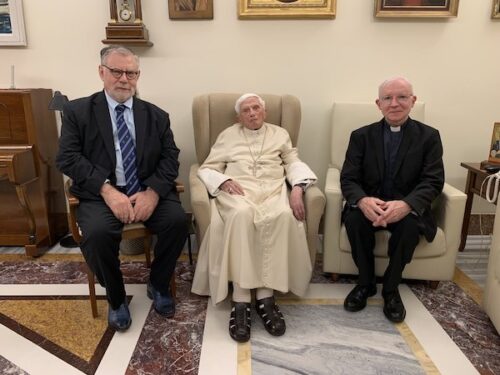
By Elise Ann Allen
ROME (Crux) — Pope Francis Wednesday thanked retired Pope Benedict XVI for his silent service to the church and asked the faithful to offer special prayers for his predecessor, who, Pope Francis said, is “very sick.”
Speaking during his Dec. 28 General Audience, Pope Francis said, “I would like to ask you all to say a special prayer for Pope Emeritus Benedict, who, in silence, is supporting the Church: remember him, he is very sick, asking the Lord to console him and support him in this witness of love for the Church until the end.”
In a statement, Vatican spokesman Matteo Bruni confirmed that “in the past few hours there has been an aggravation” in Pope Benedict’s health “due to advanced age,” but that “the situation at the moment is under control, followed constantly by the doctors.”
According to the statement, Pope Francis, after his general audience, went to the Vatican’s Mater Ecclesiae monastery to visit Pope Benedict XVI.
“We join him in praying for the Pope Emeritus,” it said.
Speaking on condition of anonymity, sources with knowledge of Pope Benedict XVI’s condition said he was “normal” as of a week ago, and they did not believe there was reason to think his life was at immediate risk.
Elected in 2005 after the death of Pope John Paul II, Pope Benedict XVI sent shockwaves around the world when he renounced the papacy in 2013, becoming the first pope in 600 years to resign, saying he lacked the physical and mental strength required to fulfill the demands of guiding the Catholic Church.
Since stepping down, Pope Emeritus Benedict has resided in the Mater Ecclesiae monastery in the Vatican gardens, receiving occasional visitors, including Pope Francis and new cardinals during a consistory, and writing various contributions to books and conferences, as well as letters to friends.
Apart from a handful of conversations with mostly German-speaking journalists, he has largely kept to his vow to live “hidden to the world,” though at times media attention to his rare public remarks and writings has tended to pit him against his successor.
At 95, Pope Emeritus Benedict has been described as increasingly frail, hard of hearing and losing his sight, as well as having difficulty speaking, yet also being fully mentally astute.
Though he is no longer able to stand for the celebration of the Mass, according to previous statements made by his personal secretary, German Archbishop Georg Ganswein, he concelebrates Mass every day in a small chapel in the Vatican monastery where he lives from his wheelchair.
Despite his weakened physical state, Pope Emeritus Benedict ventured outside of the Vatican walls to visit his ailing brother, Georg Ratzinger, in Regensburg in June 2020.
Georg died shortly after that visit, leaving Pope Benedict as the last of the Ratzinger siblings. Their sister Maria, who never married, but who managed Pope Benedict’s apartment in Rome after he was named a cardinal, died in 1991 after suffering a massive heart attack during a visit to their parents’ tomb.
Pope Emeritus Benedict himself has made past references to the end of his earthly life, saying in a letter published in an Italian newspaper in 2018 that he was on a “pilgrimage towards home.”
In the letter sent to the Italian newspaper Corriere della Sera to thank readers for their best wishes on the 5th anniversary of his resignation, Pope Emeritus Benedict said he was “moved that so many readers want to know how I spend my days in this, the last period of the life.
“I can only say that with the slow withering of my physical forces, interiorly, I am on a pilgrimage towards home,” he said.Last year, Pope Emeritus Benedict also made a seemingly ominous statement following the death of a longtime friend, Cistercian monk Gerhard Winkler, a fellow professor during Pope Emeritus Benedict’s time at Regensburg, who died in September 2021 at the age of 91.
Following Winkler’s death, Pope Emeritus Benedict wrote a letter saying he was “deeply” moved by his friend’s death.
“Of all my colleagues and friends, he was the closest to me,” he wrote in the letter, saying, “Now he has reached the afterlife, where many friends certainly await him. I hope I can join them soon.”
